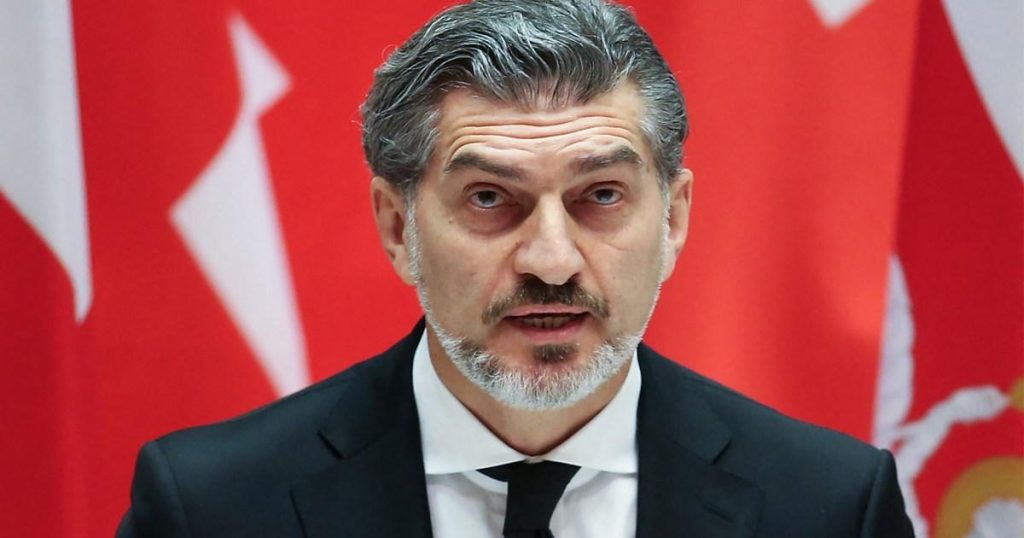Mikheil Kavelashvili’s Controversial Ascent to the Georgian Presidency
Mikheil Kavelashvili, a 53-year-old former footballer who once graced the pitch for Manchester City, has been sworn in as the President of Georgia, marking a new chapter in the nation’s political landscape. However, his ascension has been met with widespread condemnation and protests, casting a shadow over his presidency from the outset. The election process that propelled him to power has been denounced as "illegitimate" by the outgoing president, Salome Zourabichvili, and the four major opposition parties, further fueling the political turmoil. Kavelashvili’s affiliation with the far-right Georgian Dream party, whose parliamentary victory in October was marred by allegations of fraud, has also contributed to the public outcry. These concerns are amplified by the Georgian government’s recent decision to suspend its application to join the European Union, a move that has sparked further protests and fueled anxieties about the country’s future direction. Kavelashvili’s inauguration took place behind closed doors in the capital city of Tbilisi, while thousands of protesters voiced their dissent on the streets.
Kavelashvili’s journey from the football field to the highest office in Georgia has been marked by both athletic achievement and political controversy. His football career began in his native Georgia with Dinamo Tbilisi before he made the leap to Manchester City in 1995. He notably scored against rivals Manchester United in his debut match, a moment of sporting triumph that would be overshadowed by later political controversies. Following his stint at Manchester City, Kavelashvili played for several Swiss clubs, including Grasshoppers, Zurich, Luzern, Sion, Aarau, and Basel. His attempt to transition into football administration was thwarted in 2015 when he was disqualified from running for president of the Georgian Football Federation due to a lack of higher education, a prerequisite for the position.
Kavelashvili’s foray into politics began in 2016 when he was elected to parliament as a member of the Georgian Dream party. He later co-founded the People’s Power party in 2022, a political entity widely seen as an offshoot of Georgian Dream. Throughout his political career, Kavelashvili has gained notoriety for his anti-Western stance and his pro-Russian leanings, placing him at odds with many in Georgia who aspire to closer ties with Europe. His controversial views have extended to social issues as well, with Kavelashvili making several anti-LGBTQ remarks and defending Georgian Dream’s adoption of Kremlin-style laws curtailing LGBTQ rights. He has also accused Western leaders of attempting to draw Georgia into the conflict between Russia and Ukraine, further exacerbating tensions.
The driving force behind Kavelashvili’s presidential nomination is widely believed to be Bidzina Ivanishvili, a billionaire former prime minister and the founder of the Georgian Dream party. Ivanishvili, considered by many to be the most powerful figure in Georgia, described Kavelashvili as an "outstanding" politician and athlete, drawing a stark contrast with outgoing President Zourabichvili, whom he accused of "gross betrayal" of the country. This overt endorsement from such a powerful figure underlines the complex dynamics at play within Georgian politics and further fuels suspicions about the legitimacy of Kavelashvili’s election.
The widespread protests that have accompanied Kavelashvili’s rise to power reflect deep-seated anxieties within Georgian society. Protesters have labeled him a "puppet" of Ivanishvili, expressing concerns that he will serve as a tool to consolidate the billionaire’s influence and further erode democratic norms. Kavelashvili’s nomination was met with anger and dismay, particularly among those who advocate for Georgia’s integration with the European Union. Critics see his presidency as a symbol of the country’s drift away from its Euro-Atlantic aspirations and towards a closer alignment with Russia. The protests underscore the deep divisions within Georgian society and the challenges facing the newly elected president.
The controversy surrounding Kavelashvili’s election extends beyond public protests and opposition party criticisms. Constitutional law experts, including Vakhtang Khmaladze, one of the authors of Georgia’s constitution, have questioned the legitimacy of the electoral process. Outgoing President Zourabichvili, while previously backed by Georgian Dream, has also challenged the election’s validity, further highlighting the legal and constitutional questions surrounding Kavelashvili’s ascent to power. Zourabichvili’s court bid to annul the election was ultimately dismissed, but her continued refusal to step down as president, despite leaving the presidential palace, signals ongoing resistance to the new administration. The complex interplay of political figures, public dissent, and legal challenges paints a picture of a deeply divided nation grappling with its future direction.




